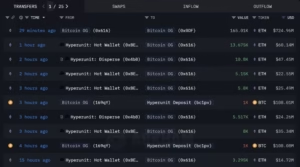In the rapidly evolving landscape of artificial intelligence (AI) and cryptocurrency, key figures emphasize the importance of intrinsic utility, particularly when it comes to AI agents and their tokens. Changpeng Zhao (CZ), a prominent voice in the crypto world and the founder of Binance, asserts that not every AI agent requires its own cryptocurrency. This perspective comes amid a significant downturn in the market for AI-related tokens, which have experienced a staggering 61% decline from their peak market capitalization of $70.4 billion.
Zhao recently stated, “While crypto is the currency for AI, not every agent needs its own token. Agents can take fees in an existing crypto for providing a service.” His remarks highlight a crucial consideration: the focus should be on the utility that these AI agents can provide rather than merely launching tokens. In the past month alone, the cumulative market capitalization for AI tokens has fallen by over 21%, now sitting at approximately $27 billion, based on data from CoinMarketCap.
The decline in value can partially be attributed to broader corrections within the cryptocurrency market. However, Zhao points to a critical issue—a lack of focus on the actual utility of these AI agents. This sentiment was further echoed during a recent panel discussion at Consensus 2025 in Hong Kong, where venture capitalists expressed excitement about the future potential of AI agents but were hesitant to invest directly at this stage.
Despite current challenges, the capabilities of AI agents continue to grow. These agents have started executing autonomous transactions on the blockchain, signifying a shift in how services are provided without the direct intervention of humans. Recently, an AI agent named Luna utilized the Virtuals Protocol to seek out image-generation services, successfully engaging another autonomous agent, STIX Protocol, for the task. Following the service, Luna compensated STIX Protocol with $1.77 worth of tokens, demonstrating a tangible application of AI in blockchain transactions.
This newfound interest in AI agents could hint at a promising future, as industry observers remain optimistic about potential growth in AI-driven cryptocurrencies for the upcoming year. Experts like Alvin Kan from Bitget Wallet predict that emerging narratives such as decentralized AI agents and tokenized assets are set to emerge, despite inherent risks. Firms like ai16z and Hyperliquid are expected to lead this growth trajectory in 2025, marking a technological shift in the investment landscape.
As the industry moves forward, it is essential for stakeholders to focus on enhancing the utility of AI agents. Only those who can demonstrate significant scale should consider launching new tokens, to ensure that value remains aligned with actual service provision and user needs.




